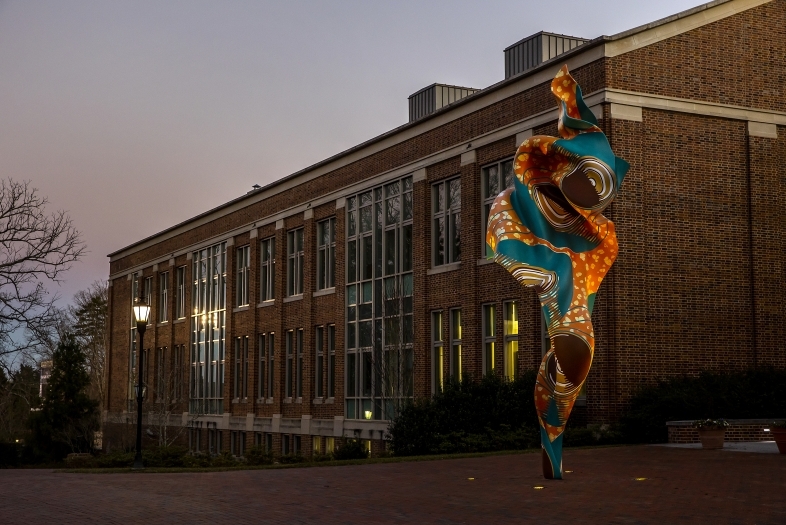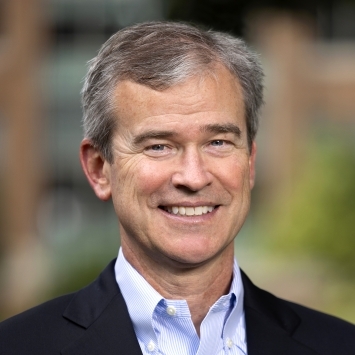
Grants & Endowments
Thanks to generous funding, we are able to offer a number of opportunities beyond the classroom to further the learning of public health for students at Davidson.
Opportunities range from grants for experiential learning to a symposia on ethics in the healthcare professions.
Donald Winfrey Memorial Grant for Public Health Research
This fund supports students who wish to pursue international travel, study and research related to Public Health. This grant is administered through the Dean Rusk International Studies Program.
Davidson College Public Health Experiential Learning Grant
Established by Mary Kathryn Rains Poole ’09 and Blake Poole ’08, this fund aids students participating in unpaid or low-paying experiential learning opportunities related to public health policy programs or research.
2022-23 West Virginia (WV) Behavioral Health Practicum Pilot. This experiential learning opportunity is in partnership with the WV Department of Health and Human Resources, Bureau for Behavioral Health (WVBBH). Participating students gain experience working on mental health and the overdose epidemic in a health department in an underserved state, including topics such as stakeholder engagement, health equity, compassion fatigue, stigma reduction, and health workforce shortages in the wake of the COVID-19 pandemic.
Frederick Womble Speas '43 Memorial Colloquium in Medical Humanities
Frederick Womble “Freddy” Speas '43 was a medical student and member of the Davidson College Class of 1943. Freddy was just a few weeks short of receiving his M.D. from Bowman Gray School of Medicine in Winston-Salem, North Carolina, when he passed away at New York Cancer Hospital (now Memorial Sloan-Kettering Cancer Center). He had been diagnosed with leukemia following a routine physical for entry into the Navy. Despite his illness, he fought to finish his medical studies, and even when too ill to attend classes, he allowed himself to be used as a test subject for the study of leukemia, about which not much was known at the time.
The Frederick Womble Speas Memorial Bioethics Symposium at Davidson College, a symposium on ethics in the healthcare professions, was established by R. Dixon Speas in memory of his brother. In the words of the Memorial lecture's Mission Statement: "Freddy's foreshortened life embodied the ideals of compassion and caring to an extraordinary degree.
2024 John T. Brooks, MD, Chief Medical Officer Division of HIV Prevention Centers for Disease Control and Prevention, “Lessons from the COVID-19 Response: Reflections on Masking”
2024 Sarah Lebu, MPH, MCP, Ph.D., “Public Health Roundtable”
2023 Shannon Hader, MD, MPH, Dean of the School of International Service at American University Former Assistant Secretary-General of the United Nations and Deputy Executive Director of Programmes at the Joint United Nations Programme on HIV/AIDS (UNAIDS), "Public Health Diplomacy: A Non-Traditional Path to Global Service."
2022 David Cantor, Ph.D., Deputy Director of Measurement and Insights at the Bill and Melinda Gates Foundation, "Global Communications: A Vaccine Case Study."
2022 Alan E. Greenburg, MD, MPH, Professor in the Department of Epidemiology in the GW Milken Institute School of Public Health, and a Professor of Medicine and Microbiology, Immunology and Tropical Medicine in the GW School of Medicine and Health Sciences, "Four Decades as an HIV Epidemiologist and Public Health Physician - Roads Traveled and Lessons Learned."
2022 Karen M. Meagher, Ph.D., Assistant Professor and Associate Director of Public Engagement in the Biomedical Ethics Research Program, Mayo Clinic "Antibiotic Resistance and the Ethics of Reputation and Regret."
2018 Robert Childs, MPH, Executive Director, North Carolina Harm Reduction Coalition (NCHRC), “Harm Reduction and Drug Policy Reform in NC.”
2017 Lisa Rasmussen, Ph.D., Associate Professor of Philosophy, UNC Charlotte and Benjamin Hippen, MD, FASN, FAST, Assistant Director of CMC Kidney Transplant, Metrolina Nephology. "Between Two Ethicists"
2015 Panelist Wayne M. Soltile, Ph.D., Mary O. Soltile, MA, LPC, Julia Sotile Orlando, MSW, LCSW, and Rebecca Soltile Fallon, MS, Soltile Center for Physician Resilience. " Healthcare, Resilience, and Burnout."
2014 Marion Danis, M.D., Department of Bioethics, National Institute of Health, “Research Ethics Consultation”
2013 Thomas Stossel, MD, Translational Medicine, Harvard Medical School and Derek Raghavan, MD, PhD, FACP, FRACP, FASCO, President, Levine Cancer Institute, “Comparative Effectiveness: Friend or Foe of Innovation?"
2013 Derek Raghavan, MD, PhD, FACP, FRACP, FASCO, President, Levine Cancer Institute, “Cancer Care: Science, Practices and Ethics.”
2012 Speakers Stephen Wear, Ph.D., SUNY- Buffalo, Giles Schofield, J.D., M.A., McMaster University, and George Agich, Ph.D., Bowling Green State University (Retired), “Clinical Ethics Consultation: The Very Idea.”
2011 Speakers Steven Valeika, D.V.M., Ph.D., Assistant Professor of Epidemiology, University of Georgia Public Health, John Moskop, Ph.D., Wallace and Mona Wu Chair in Biomedical Ethics, Professor of Internal Medicine, Wake Forest University School of Medicine, and Jeffrey Engel, M.D., State Health Director, NC Department of Health and Human Services “Pandemic Planning: Issues for Public Health, Bioethics and Law.”
2010 Speakers Catherine Myser, Ph.D., Founder, Bioethics By and For the People, Howard Brody, M.D., Ph.D., University of Texas Medical Branch, and Thomas P. Stossel, M.D., Brigham & Women’s Hospital, Harvard Medical School, “Contemporary Challenges in Medicine and Research.”
2009 Speakers Sally Satel, M.D., Mark Smith, Ph.D., Associate Professor of Psychology, Davidson College, Alison Snow Jones, Ph.D., Associate Professor, Dept. of Social Sciences & Health Policy, Division of Public Health, Wake Forest University Health Sciences, and Russell Crandrall, Ph.D., Associate Professor of Political Science, Davidson College, “Addiction and Responsibility.”
2008 Speakers Alexander Capron, J.D., University Professor, Scott H. Bice Chair in Healthcare Law, Policy and Ethics, Professor of Law and Medicine, USC Gould School of Law, Michael Oldani, Ph.D., Assistant Professor, Medical Anthropology, Sociology and Anthropology Department, University of Wisconsin, Whitewater, Robert Cook-Deegan, M.D., Director, IGSP Center for Genome Ethics, Law & Policy, Kevin Powell, M.D., Ph.D., F.A.A.P., Philip Rosoff, M.D., F.A.A.P., Director of Duke Hospital Clinical Ethics Program, Pediatric Hematology-Oncology, Trent Center for Bioethics, Humanities and History of Medicine, Duke University, Laurence McCullough, Ph.D., Center for Medical Ethics and Health Policy, Baylor College of Medicine, and Nancy M. P. King, J.D., Professor, Department of Social Sciences and Health Policy, Director of Program in Bioethics, Health, and Society, Wake Forest University School of Medicine, “Authority and Responsibility in Medicine and Health Care.”
2007 Speakers Sally Satel, M.D., Virginia Postrel, Michele Goodwin, J.D., L.L.M., Chair and Director, Health Law Institute and RABE Center, DePaul University College of Law, and Gregory Larkin, M.D., M.S.P.H., Professor of Surgery, Yale University School of Medicine, “Altruism in Medicine and Health Care.”
2006 Speakers Robert L. Goodman, M.D., Columbia University Medical Center, Nancy P.M. King, Ph.D., Professor of Social Medicine, UNC Chapel Hill, and Wes Hofferbert, M.C., Department of Internal Medicine, Carolinas Medical Center, “Problematic Patients, Problematic Doctors.”
2005 Speakers Stuart J. Youngner, M.D., Chairman, Department of Bioethics, Case Western Reserve University, Robert Sade, M.D., Professor of Surgery (Cardiothoracic), Medical University of South Carolina, Norman Fost, M.D., M.P.H., Professor, Department of Pediatrics and History of Medicine, University of Wisconsin, and Allen Buchanan, Ph.D., Professor of Public Policy and Philosophy, Duke University, “Organ Transplantation: How Far Have We Come, How Far Should We Go?”
2004 Speakers Lawrence J. Schneiderman, M.D., Professor of Departments of Family and Preventive Medicine and Medicine at the School of Medicine, University of California, San Diego, and Stephen J. Morse, J.D., Ph.D., Professor of Law and Professor of Psychology and Law in Psychiatry at the University of Pennsylvania Law School, “Managing Pain Ethically.”
2003 Mark Hall, J.D., Professor of Law and Public Health at Wake Forest University and Loretta M. Kopelman, Ph.D., Professor and Chair of the Department of Medical Humanities at the Brody School of Medicine, East Carolina University, “Conflicts of Interest in Health Care and Human Subjects Research.”
2002 Carl Cohen, Ph.D., Professor of Philosophy at the University of Michigan, “Responsibility for Health Status.”
2001 E. Haavi Morreim, Ph.D., Professor, Department of Human Values and Ethics and Professor, Division of Health Services and Policy Research, Department of Preventative Medicine at the College of Medicine at the University of Tennessee, “Errors & Accountability in Health Care.”
2000 Richard A. Epstein, James Parker Hall Distinguished Service, Professor of Law, University of Chicago, “American Health Care: The Way It Is, The Way It Ought to Be.”
1999 Wayne B. Jonas, M.D., Department of Family Practice and the Department of Preventive Medicine/ Biometrics at the Uniformed Services University of the Health Sciences (USUHS), “Alternative Medicine: Science, Evidence or Anecdote?”
1998 John Lantos, M.D., Associate Director, Center for Clinical Medical Ethics, University of Chicago, Associate Professor of Pediatrics, Section of Chronic Diseases, University of Chicago
1997 Eric J. Cassell, M.D., M.A.C.P., Practicing internist and attending physician at The New York Hospital, Clinical Professor of Public Health at Cornell, University Medical College
1996 Richard Epstein, J.D., James Parker Hall Distinguished Service, Professor of Law at the University of Chicago, “Redesigning Ourselves, Engineering Our Children: The Ethical, Legal & Social Implications of the Human Genome Project.”
1995 Rosalie Kane, D.S.W., Professor, Institute for Health Services Research, and Director, National,LTC Resource Center, School of Public Health, University of Minnesota, “Aging and Dying in America: Ethically and Economically.”
1994 Edmund D. Pellegrino, M.D., Director of the Joseph and Rose Kennedy Institute of Ethics and John Carroll Professor of Medicine and Medical Humanities at Georgetown University, “Beyond Cost & Access: The Moral Dilemma of Quality”
1993 H. Tristram Engelhardt, Ph.D., M.D., Professor, Departments of Medicine, Community Medicine and Obstetrics and Gynecology Baylor College of Medicine, “Ethical Issues in Managed Care: For Patients, For Providers, For Payers, and for the Commonwealth.”
1992 Carl Cohen, Ph.D., Professor of Philosophy University of Michigan, “Health Care Reform...Justice and the American Way.”
1991 George Annas, JD, MPH., Edward R. Utley Professor of Health Law, Schools of Medicine and Public Health Boston University, “Law, Medicine, Public Policy: Weaving Alliances.”
1990 Speakers Rosemarie Tong, Ph.D., Thatcher Professor of Medical Humanities and Philosophy Davidson College; Todd L. Savitt, Ph.D., Professor, Dept. of Medical Humanities East Carolina University School of Medicine; Howard Brody, M.D., Ph.D., Associate Professor, Family Practice & Philosophy and Director, Center for Ethics&Humanities in Life Sciences Michigan State University; Frank H. Marsh, J.D., Ph.D., Professor of Medical Ethics and Law and Director, Program in Medical Ethics University of Colorado Health Sciences Center; Abigail D. Zuger, M.D., Division of Infectious Diseases Dept. of Medicine Montefiore Medical Center; Reinhard Priester, J.D., Research Fellow Center for Biomedical Ethics University of Minnesota, “Contemporary Challenges to the Health Care System: Responsible and Responsive Medicine in the 1990’s.”
1989 Edmund D. Pellegrino, M.D., Director of the Joseph and Rose Kennedy Institute of Ethics and John Carroll Professor of Medicine and Medical Humanities at Georgetown University, “Rationing Medical Care: Can We Do It Fairly and Compassionately?”
1988 Edmund D. Pellegrino, M.D., Director of the Joseph and Rose Kennedy Institute of Ethics and John Carroll Professor of Medicine and Medical Humanities at Georgetown University, “Harm Reduction and Drug Policy Reform in NC.”
John and Mary Gyves Fund for Public Health and Ethics
Established in loving memory of these parents of three Davidson sons, this fund provides support for and encourages student research, scholarship, deep engagement and active participation in the fields of global health, public health, public health ethics, bioethics and medicine.
American Public Health Association’s (APHA) 2023 Policy Action Institute in Washington, DC. A two-day in-person conference for public health leaders, students and advocacy experts, a collaborative event to discuss proven and proposed policy solutions to tackle today’s most pressing health threats at the local, state and federal levels. Three Davidson students attended.

We had a standing room only event for Dr. Hader, who was an inspiring advocate for setting aside politics and implementing lifesaving programs through global public health roles. Some 40% of incoming Davidson students have professed a desire to pursue a health-related career after graduation, but few consider a role in the public sector. Dr. Hader was able to give concrete examples of the power of such roles, both at the national and municipal level, and stayed long beyond the program’s end to speak directly with individual students seeking guidance on how they too might pursue such an impactful career.
speaking about a Frederick Womble Speas '43 Memorial Colloquium in Medical Humanities that took place on campus in 2023.